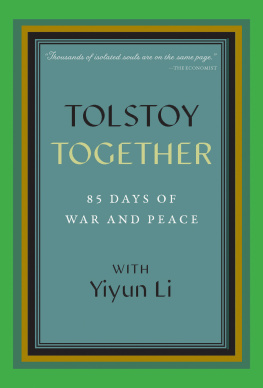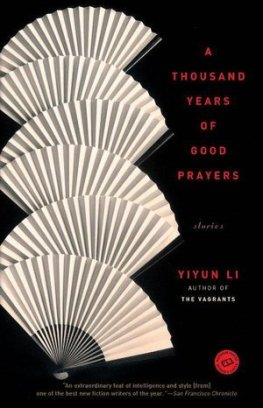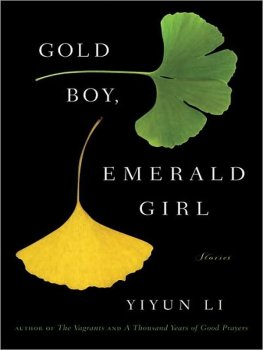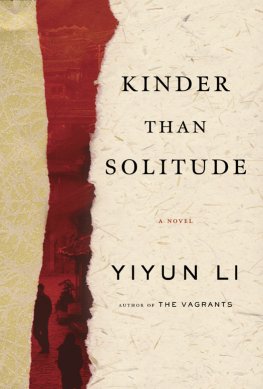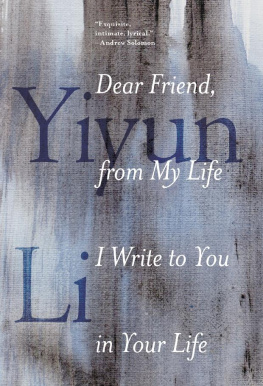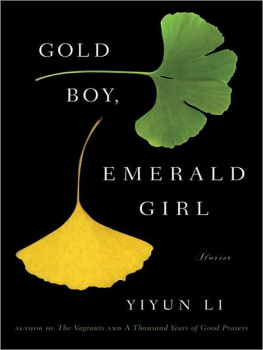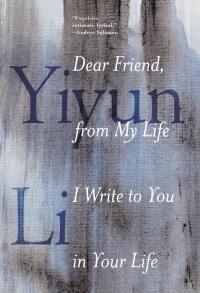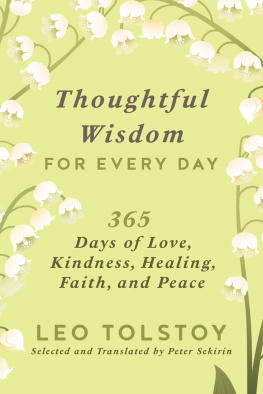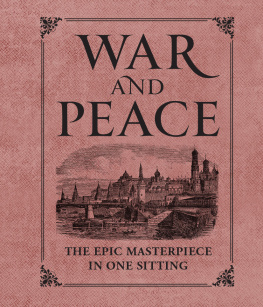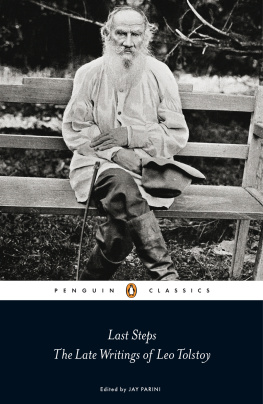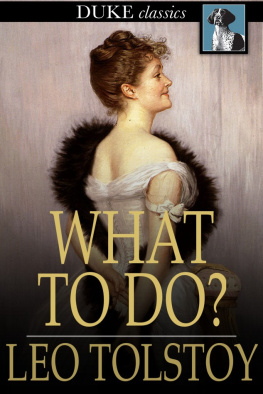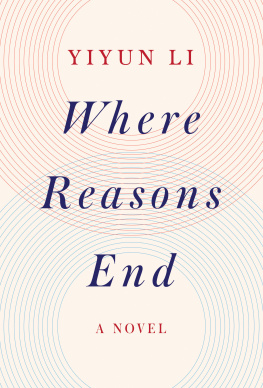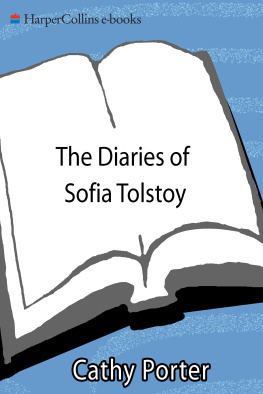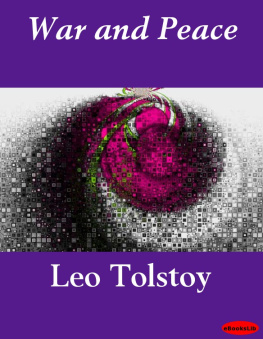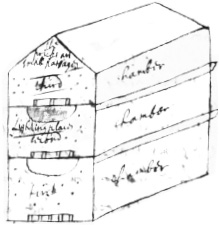Table of Contents
Page List
Guide
TOLSTOY TOGETHER
ALSO BY YIYUN LI
Must I Go
Where Reasons End
Dear Friend, From My Life I Write to You In Your Life
Kinder Than Solitude
Gold Boy, Emerald Girl
The Vagrants
A Thousand Years of Good Prayers
TOLSTOY TOGETHER
85 DAYS OF WAR AND PEACE WITH YIYUN LI
EDITED BY BRIGID HUGHES
A PUBLIC SPACE BOOKS
A PUBLIC SPACE BOOKS
PO BOX B
NEW YORK, NY 10159
COPYRIGHT 2021 BY A PUBLIC SPACE BOOKS
COPYRIGHT 2020 BY YIYUN LI
INTRODUCTION COPYRIGHT 2021 BY YIYUN LI
ALL RIGHTS RESERVED
PRINTED IN CANADA
FIRST EDITION, 2021
A Public Space gratefully acknowledges the generous support of the Drue and H. J. Heinz II Charitable Trust, the Chisholm Foundation, the New York State Council on the Arts, the Amazon Literary Partnership, and the corporations, foundations, and individuals whose contributions have helped to make this book possible.
LIBRARY OF CONGRESS CONTROL NUMBER: 2020946090
ISBN: 978-1-7345907-6-0
EISBN: 978-1-7345907-7-7
DISTRIBUTED BY PUBLISHERS GROUP WEST (PGW)
DESIGN BY DEB WOOD
WWW.APUBLICSPACE.ORG
9 8 7 6 5 4 3 2 1
That is its greatest
beauty. In some
mysterious way, the
reader collaborates
with the text and
brings it to life.
The art of writing
depends on the art
of reading.
MICHAEL SILVERBLATT
TABLE OF CONTENTS
ILANN M. MAAZEL
ALEXANDRA SCHWARTZ
TOM DRURY
CARL PHILLIPS
SARA MAJKA
ANTHONY DOMESTICO
INTRODUCTION
ONCE UPON A TIME, five people with strong opinions were invited to view an old tree and offer their thoughts.
The first one says: Im a big-picture person. At first glance, I can say this tree is too big for its own good. We need to lop some limbs off.
The second one says: Its not the architecture of the tree that bothers me but the parts that make up the whole. Anywhere I direct my attention, I can see ten or twenty imperfect leaves.
The third one says: This tree is much too old to be relevant. Its life began when the world was wrong in many ways: patriarchal, despotic, undemocratic. Why should we care about something growing out of that history?
The fourth one says: The world is still wrong in many ways. A tree like this does little to solve the political, socioeconomic, and environmental issues of today.
The fifth one says: I am not a tree person. Roses and nightingales are worthy subjects of my attention, and I consider it an insult to my talent to be asked to look at a tree.
Anytime one talks about War and Peace, one is reminded of the trees critics. Fortunately, a majestic tree has no need for a defender.
Our literary litmus paper is made, at least partially, by the impressions and memories of our senses. If a book were full of details never seen, heard, smelled, tasted, or felt by us, we might be more mystified than a goose or a cockapoo would feel when confronted with our literature, which to them must be outlandishly vague. Yet greedy readersI count myself as onecrave more than a confirmation of experience: we want writers to articulate that for which we havent yet found our own words, we want our senses to be made uncommon.
Books that I feel drawn to and reread, War and Peace among them, are full of uncommon sense and common nonsense. (Uncommon nonsense makes exhilarating literature, too, in Lewis Carrolls case, but uncommon nonsense does better to stay uncommon: in less skillful hands, it becomes caprice or parody.)
One imagines that Tolstoy did not seek to write about uncommon sense. He simply presented the world, and the world, looked at closely, is often extraordinary. A line I never tire of in War and Peace:
The transparent sounds of hooves rang out on the planks of the bridge.
Colors are regularly described as muted or loud, but sounds that are transparent make a reader pause. The ringing hooves take me back to my early childhood in Beijing, where cars were scarce, and flatbed horse trailers passed in the street, carrying coal, lumber, produce, and sometimes people huddled together. Forty years later, I can still hear those horses walking down the narrow path outside our apartment on winter mornings as I lay awake, the sky dark but for a thin patch of paleness in the east, a predawn color called yu du bai (fish-belly white) in Mandarin. And therewhen the outdoor and indoor were visible with shapes but not colors, when the tip of my nose turned cold if I let my head surface from the burrow between the quilt and the pillow (the heating in the building was only turned on from 7:00 P.M. to midnight), when, contrary to reality yet common to childrens perception, the world was still new and I was old enough for everythingthere went the tapping of the hooves, clippity-clop, clippity-clop, a sound like no other, metallic, clear, yet without any harsh or sharp edge. Transparentyes, and tangible.
One who sees so much and so well does not need to invent; one who observes imaginatively does not need creative imagination, Stefan Zweig said of Tolstoy. One who sees so much and observes imaginatively also makes the best demand of his readers: to read unhurriedly as one must live unhurriedly, with imagination, which is akin to reverie.
Although moments of uncommon sense abound in War and Peace, they are no more than the grace notes in the novel. Tolstoys interests were in humans and their limitations, in nations and their histories. Readers, whether they are reading during the Stalingrad battles (Vasily Grossman), or in a cramped high-school dorm in Beijing in the 1980s (a friend of mine), or, as during our first Tolstoy Together group, at the beginning of a pandemic (three thousand readers from around the globe, many under lockdown), must have no difficulty finding their worlds reflected in War and Peace: the man-made and natural catastrophes; the egomanias and incapacities in those designers of national and international schemes; the boundless human indifference; the inevitable human kindness; deceptions and strivings in marriages and in families; friendships and loves lost and found. The most absurd element of human absurdity, ironically, is that the absurdity is one of the most universal featuresit would be a truly strange world if our absurdities turned out to be rare and unique. What binds people to one another more sturdily than our common nonsense? Even the Greek gods would have been forgotten had they been sensible.
Anna Mikhailovna was already embracing her and weeping. The countess was also weeping. They wept because they were friends; and because they were kind; and because they, who had been friends since childhood, were concerned with such a mean subjectmoney; and because their youth was gone.
Tears in literature do not necessarily move the readers as they move their shedders. If I am asked to name five unforgettable scenes in all the books I have read that involve a characters tears, I may be able to offer only one example: the passage featuring Anna Mikhailovna and Countess Rostova is one of the moments in

